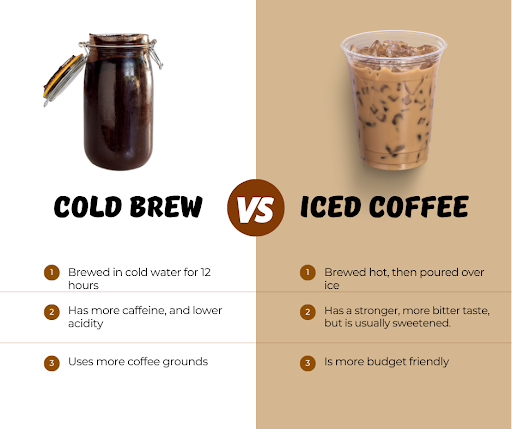
Cold brew coffee delivers a smooth, rich flavor that has captured the hearts of coffee enthusiasts globally. Its low acidity and versatility make it an attractive alternative to traditional hot-brewed coffee. This comprehensive guide explores advanced tips, variations, and practical insights to help you master cold brew coffee. You’ll also get a personal perspective from someone who has integrated this delightful beverage into their daily routine.
Why Cold Brew Coffee Is Special
Cold brew is more than just iced coffee—it’s a unique brewing method with distinct qualities:
- Lower Acidity: Cold brewing extracts fewer acidic compounds, resulting in a gentler taste.
- Natural Sweetness: The absence of heat highlights the beans’ inherent sweetness, often with mellow, chocolatey notes.
- Versatility: Cold brew concentrate is perfect for creating a variety of beverages, from iced lattes to cocktails.
- Convenience: A single batch stays fresh for up to two weeks in the fridge.
Selecting the Best Coffee Beans for Cold Brew
Choosing the right coffee beans significantly enhances your cold brew experience.
Roast Level
Opt for medium to dark roasts. These bring out rich, nutty, and chocolatey flavors that complement cold brewing.
Single-Origin vs. Blends
Single-origin beans highlight unique flavor notes, while blends provide a more balanced profile. Try both to find your preference.
Freshness Matters
Freshly roasted beans, ideally within two weeks of roasting, deliver the best results.
Alternative Cold Brew Methods to Explore
Beyond the basic mason jar method, advanced brewing options can refine your cold brew process.
Cold Brew Coffee Makers
Specialized devices like the OXO Brew Compact Cold Brew Coffee Maker simplify the process with built-in filters and spouts.
- Recommended For: Frequent cold brew drinkers seeking convenience.
French Press
A French press works wonderfully for small cold brew batches. After steeping, simply press the plunger to separate grounds from the concentrate.
- Recommended For: Minimal cleanup and smaller quantities.
Toddy Cold Brew System
The Toddy system is designed for enthusiasts, using a felt filter to produce a smooth and rich concentrate.
- Recommended For: Large batches with professional-level quality.
My Personal Journey with Cold Brew Coffee
My cold brew adventure began with simple curiosity. Starting with the basic mason jar method, I steeped coarse grounds overnight, yielding a smooth, velvety coffee. The flavor was less bitter than iced coffee, and I was hooked.
Over time, I invested in a dedicated cold brew maker, choosing the OXO Brew Compact. It streamlined the process with its built-in filter and easy-pour spout, saving time and reducing mess. Experimenting with various coffee beans and ratios allowed me to tailor flavors to my liking—from fruity Colombian medium roasts to deep, rich Sumatran dark roasts.
Filtered water and steeping times also became crucial factors in achieving the perfect brew. With a bit of patience, cold brew became a staple in my kitchen, offering versatility for black coffee mornings or oat milk lattes with a hint of vanilla.
Advanced Techniques to Enhance Your Cold Brew
Take your cold brew to the next level with these creative tips:
Infuse with Flavors
Add spices, citrus peels, or herbs during steeping. Popular choices include cinnamon sticks, orange peels, and mint leaves.
Experiment with Ratios
Adjust the standard 1:4 coffee-to-water ratio for a stronger concentrate (e.g., 1:3) or a lighter brew.
Try Milk Alternatives
Cold brew pairs beautifully with almond, oat, or coconut milk, each offering a unique twist.
Coffee Ice Cubes
Freeze leftover cold brew into ice cubes to avoid dilution as they melt.
Sweeten Creatively
Natural sweeteners like honey, agave syrup, or flavored syrups complement cold brew’s smooth taste.
Solving Common Cold Brew Problems
Even with its forgiving nature, cold brew isn’t foolproof. Here’s how to troubleshoot common issues:
- Weak Flavor: Increase the coffee-to-water ratio or extend steeping time.
- Bitterness: Check your grind size—it may be too fine. Avoid steeping for too long.
- Sediment in Coffee: Double-strain your brew or use a finer filter.
- Cloudy Concentrate: Ensure your brewing container and filter are clean.
Seasonal Cold Brew Variations
Enjoy cold brew year-round with these seasonal twists:
- Summer: Classic iced cold brew with water, ice, and a splash of milk or cream.
- Fall: Spiced latte with steamed milk and pumpkin spice.
- Winter: Cold brew hot chocolate—a rich, warming treat.
- Spring: Floral cold brew infused with lavender or rose petals.

Conclusion
Cold brew coffee is more than a drink; it’s a versatile, customizable experience that fits any lifestyle. With its smooth flavor, reduced acidity, and creative serving options, cold brew is perfect for seasoned coffee lovers and curious beginners alike. Use this guide to explore, experiment, and refine your technique—your ideal cup is just a few tweaks away!
Frequently Asked Questions (FAQ)
Can I make cold brew with pre-ground coffee?
Yes, but it’s not ideal. Pre-ground coffee’s finer grind may cause over-extraction. Opt for coarse ground beans.
How is cold brew different from iced coffee?
Cold brew is steeped in cold water, resulting in a smoother flavor, while iced coffee is hot-brewed and served over ice.
How long should I steep cold brew?
Typically, 12–24 hours. Longer steeping creates a stronger brew but may introduce bitterness.
Can I reuse coffee grounds for cold brew?
No, reusing grounds results in weak, flavorless coffee.
Can I heat cold brew concentrate?
Yes, dilute it with hot water for a smooth hot coffee.
How should I store cold brew?
Store it in an airtight container in the fridge for up to two weeks.
Can I use flavored beans for cold brew?
Absolutely, but ensure the beans are high-quality to avoid artificial aftertastes.
Why is my cold brew cloudy?
Cloudiness often stems from sediment. Use finer filters or double-strain your brew.